London Olympic champion Oh Jin Hyek missed out on a place on the Rio team – but he’s back on the international circuit and shooting to win again. John Stanley catches up with him at the Shangahi World Cup stage
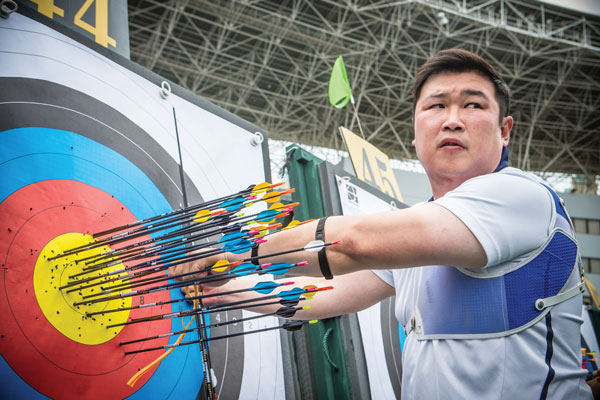
After nearly eight years on the front lines of the Korean recurve machine, his dream of defending his London 2012 Olympic title was dashed when he failed to make the team going to Rio in spring last year
Oh Jin Hyek is very much back. After nearly eight years on the front lines of the Korean recurve machine, his dream of defending his London 2012 Olympic title – or even of another Olympics – was dashed when he failed to make the team going to Rio in spring last year. Afterwards, a tearful Oh said, “I will be back” to the waiting media. In 2017, he has made good on that promise.
After a tentative showing on the indoor circuit earlier this year, Jin Hyek was stellar at the Korean outdoor selection trials and is out competing again on the first team in a World Championship year. The senior member of the squad at 35 years old, he is officially the men’s team captain. His first international fixture for Korea was the Shanghai stage of the World Cup, where he made the quarterfinals individually and was on the Korean men’s team that took silver at Sunday’s finals.
We caught up with him in Shanghai and asked him about leading one of the most decorated Korean teams ever – and the pressure to maintain results.
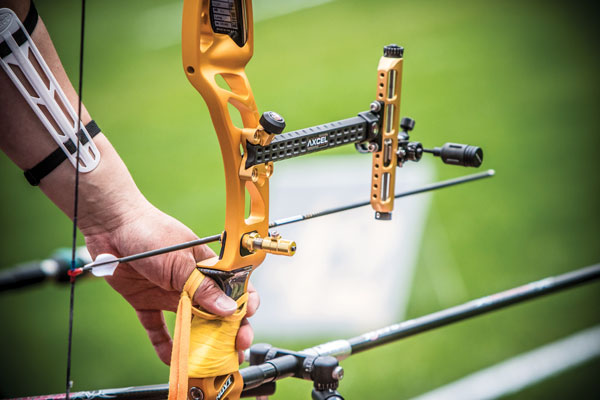
Jin Hyek was stellar at the Korean outdoor selection trials and is out competing again on the first team in a World Championship year
What’s it like to be back on the World Cup circuit?
It feels like it’s been too long since I’ve been to a World Cup even though it’s only been a year. So, it feels a little awkward still. Last year, I had time to rest, and shot national competitions with my team, which was a good opportunity for me to try some new things I had wanted to try with my technique.
2016 must have been a tough year…
During last year’s national team selections [for the Olympics], I just needed an 8 to win the match and make the team. I ended up shooting a 7 and we ended up going to a shoot-off, which I lost in the end. It was terrible, the biggest regret of my life. I was furious. I decided to change my arrow nock and vane colours that I had used from the start and changed some of my equipment setup. I wanted to throw away everything I’d had previously and start again.
The Olympic finals were shown in the very early morning in Korea. Did you get up to watch them, or was it too painful?
Yes, I watched everything we were involved in. Of course, it would have been nice if I had been able to go too, but the younger archers, my teammates, did so well. So that’s something I was grateful for. I’m glad they went and showed just how good Korea can be.

“It feels like it’s been too long since I’ve been to a World Cup even though it’s only been a year!”
You’re captaining one of the strongest Korean teams ever. What do you have to do?
They’re all doing well so there’s nothing really to pick out. In [Kim] Woojin’s case, he’s doing well in competitions and as for [Im] Dong Hyun, it’s been a little while since he’s come out to a World Cup but he had great results at national competitions last year.
There’s nothing in particular I have to worry about, but I think there’s a bit of a burden on our athletes because we did so well last year. Dealing with that burden is something I’m trying to help the team with. I think if they start the competition with these pressures, it will be really hard on them, so I say things like “shoot without any pressure.”
There’s a new member of the recurve team we’ve not seen before: Kim Jongho…
He has an advantage in that he’s young and can compete without any worries. He’s diligent, from the military archery team, and I think he’s got a strong mental game and a genuine personality. So I think he will do just fine. The mental side is so important.
There’s so many good archers in Korea, but the Youth Olympics champion Lee Woo-Seok stands out in competitions. But in national team selections, I’m not sure if he has been able to manage the mental aspects well. When he can overcome that, I’m sure he will do well.
Whenever there’s a new athlete or new Korean team, at least from a records or data point of view, people might think that it is a weaker team. But it’s my job to support them so that they can really show their strength, so I do my best to do that.
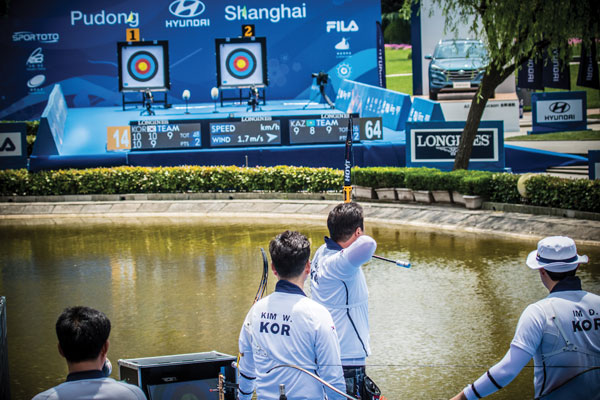
“There’s so many good archers in Korea, but the Youth Olympics champion Lee Woo-Seok stands out in competitions”
You’re looking a lot fitter physically this year…
I think it’s different for all athletes, but for me, I think it’s 50% mental and 50% physical, because you have to be physically fit to beat any poor conditions or challenging environments. But, in order to overcome those, you need to be equally tough mentally too. If you’re strong mentally but your body doesn’t keep up, you can’t overcome those challenges. So, I think it’s 50/50. Sometimes, you think it’s one over the other… but I think it’s 50/50. [laughs]
What’s the goal for this year?
This year, my goal is to go to the World Championships, although we’re still in the process of selecting the team. If I’m able to go, of course I’d like us to win the team gold and if the moment comes, I’d like to win individual gold as well. I still haven’t won the World Championships yet [he has been second twice, in 2011 and 2013]. All the athletes here are very good and I haven’t really thought about which archers in particular I need to beat. I’m more concerned that I shoot well instead. I think it’s good if you think about what you did well, like London, but that’s already in the past. I like to approach competitions with a fresh start.
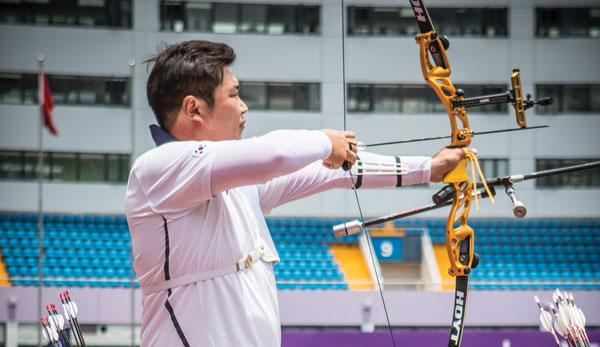
“When I was younger, I did archery because it was fun and I just enjoyed shooting. I didn’t have any ambitions.”
Your individual Asian Games title in 2014, on home turf in Korea, was your other big win after London. What made that so special?
Just like at the Olympic Games, you have athletes competing from all different countries. The Asian Games is comparable to the Pan American Games in the Americas. Since you have athletes coming from all different sports, ever since I was young, I’ve always considered it to be the second biggest competition after the Olympics.
When I was younger, I did archery because it was fun and I just enjoyed shooting. I didn’t have any ambitions. In high school, at a certain point in time, as I began shooting a bit better and won a few medals at national competitions, I started to become a bit more ambitious. I wonder if I would have done better if I had had those ambitions when I was younger. I liked playing with my friends too much when I was younger and if I had done that a little less I wonder if I could have done just a bit better.
You’re a married man now – has that changed things at all?
There are good things but there are also many difficult aspects. Some good things are that I can still come out to an international competition again and try to do well. The difficult things are that I can’t be home as often. My wife is pregnant and now I can’t go to hospital visits with her. These are just a few of the harder things.
When the baby comes I don’t think there will be anything different for me as an athlete but I think my way of thinking might be a little different. Of course I will feel more responsibility towards my family. At the moment, when I’m training I only go home once a week, on the weekends. When I’m at home, we try and get outside to get some fresh air. We go out to get good food, I try to take my wife nice places… we do things like any typical couple.
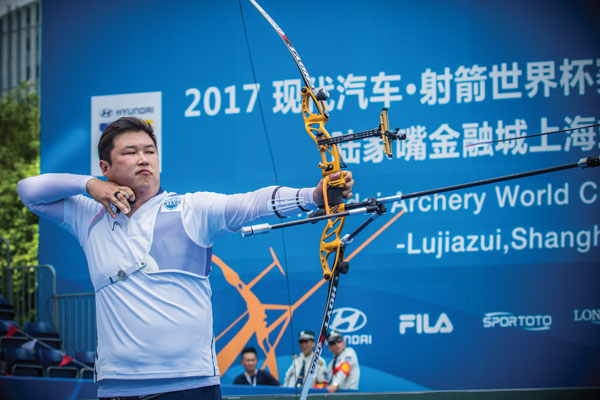
“I guess I’ll coach because it’s sort of my role right now. I think it would be a natural transition.”
You’re now the oldest member of the squad. Do you ever think about retirement?
I haven’t really given it much thought yet. My shoulder isn’t in the greatest condition so I may not be able to do archery forever. So, I don’t know exactly when.
I guess I’ll coach because it’s sort of my role right now. I think it would be a natural transition. I have a lot to live up to. My current coach Oh Kyo Moon was very successful and famous as an archer when I was young. He was a hero to me. There was so much to learn but I wasn’t sure if I would be able to learn it all. He had had so much experience and knowledge that he helped us as athletes a lot whether it was in practice, competition, shooting in the wind, or just life in general. He, himself, knew what we needed help with. He knew exactly what we needed and we didn’t have to ask for it. He did it on his own.
As an archer, how do you want to be remembered?
As someone who worked very hard.
Thanks to Chris Wells, Andrea Vasquez, Kyung Hwan Choi and Vanessa Lee for their assistance with this piece
This article originally appeared in the issue 117 of Bow International magazine. For more great content like this, subscribe today at our secure online store: www.myfavouritemagazines.co.uk

